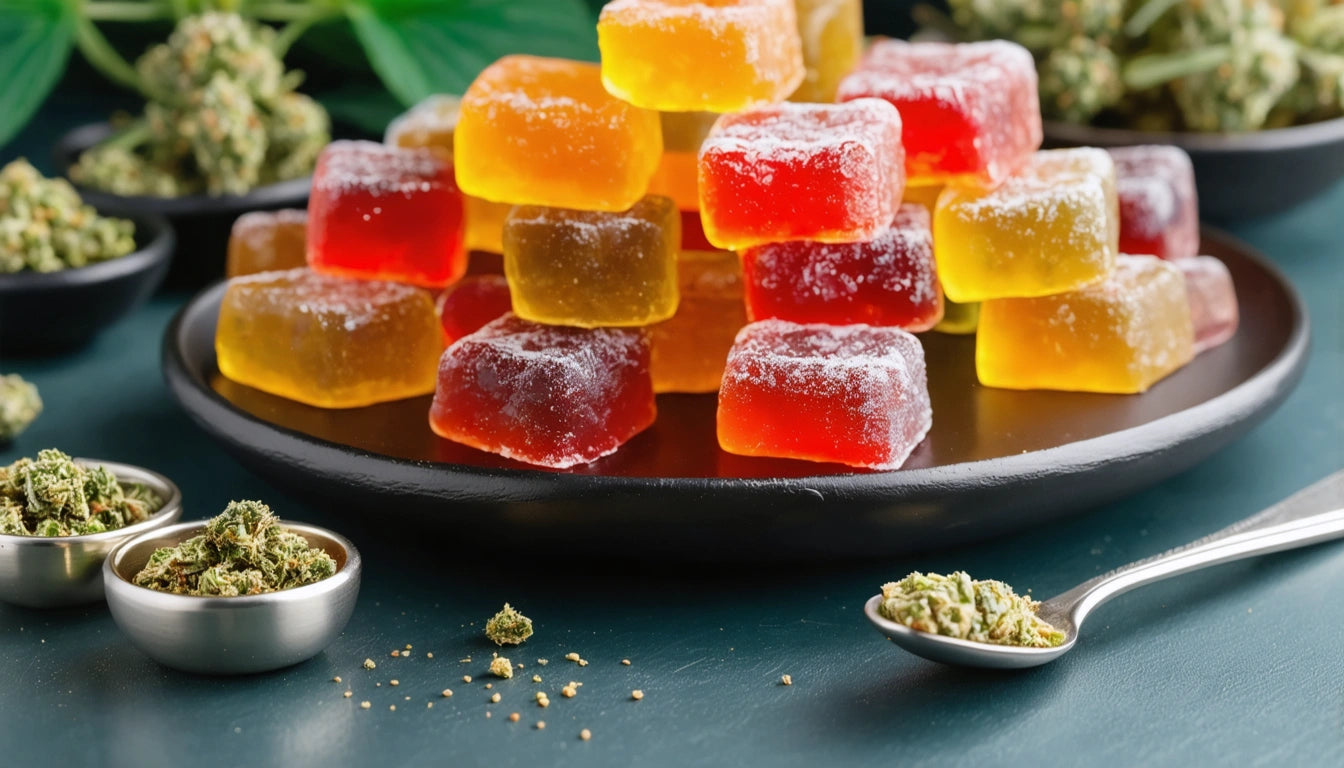How to Make Homemade Cannabis-Infused Gummies
Creating your own cannabis-infused gummies at home offers control over ingredients, potency, and flavors that store-bought alternatives can't match. This comprehensive guide walks you through the process of making delicious, consistent edible gummies using various infusion methods including oils, tinctures, and kief.
Essential Ingredients for Cannabis Gummies
Before diving into the process of how to make edible gummies, gather these key ingredients:
- Gelatin or pectin (for vegan options)
- Fruit juice, puree, or flavored drink mix
- Sweeteners (sugar, honey, or alternatives)
- Cannabis infusion (oil, tincture, or concentrate)
- Citric acid (for tartness and preservation)
- Lecithin (an emulsifier that helps bind ingredients)
- Silicone molds (various shapes available)
- Optional: food coloring, flavor extracts
Quality ingredients make a significant difference in the final product. For cannabis infusions, you can use cannabutter, coconut oil infusions, alcohol-based tinctures, or even kief, depending on your preference and equipment.
Preparing Your Cannabis Infusion
The foundation of great cannabis gummies is a properly prepared infusion. Here are the most common methods:
Infusing with Cannabutter
Learning how to make gummies with cannabutter starts with creating the butter itself:
- Decarboxylate ground cannabis (240 °F for 40 minutes)
- Simmer decarbed cannabis with butter for 2-3 hours
- Strain through cheesecloth
- Cool before incorporating into your gummy recipe
Cannabutter works well but may impart a stronger cannabis flavor compared to other methods.
Infusing with Coconut Oil
For those wondering how to make gummies with coconut oil:
- Decarboxylate your cannabis as above
- Combine with coconut oil in a slow cooker or double-boiler
- Maintain low heat (160-200 °F) for 4-6 hours
- Strain and cool
Coconut oil creates a smooth texture and carries cannabinoids effectively due to its high fat content. It's also ideal for maintaining freshness in your finished gummies, especially when proper humidity control is maintained during storage to prevent moisture issues.
Using Alcohol Tinctures
If you're exploring how to make alcohol gummies:
- Create a cannabis tincture using high-proof alcohol
- Reduce the tincture to concentrate the cannabinoids
- Add to your gummy mixture
Alcohol-based infusions can produce cleaner-tasting gummies with less herbal flavor.
Working with Kief
For those interested in how to make gummy edibles with kief:
- Decarboxylate the kief at a slightly lower temperature (220 °F for 25-30 minutes)
- Infuse into a small amount of oil or butter
- Incorporate into your gummy base
Kief offers high potency with minimal plant material, resulting in less cannabis flavor.
Step-by-Step Gummy Making Process
Now that you understand how to make cannibis gummies with various infusions, here's the basic process:
- Bloom the gelatin by sprinkling it over cold juice or water and letting it sit for 5 minutes
- Heat the liquid mixture gently, avoiding boiling
- Add sweeteners and citric acid
- Incorporate lecithin to help bind the oil-based cannabis infusion
- Remove from heat and quickly stir in your cannabis infusion
- Pour into silicone molds using a dropper or condiment bottle for precision
- Allow to set in refrigerator (2-3 hours minimum)
- Unmold and air-dry for 24-48 hours to improve texture
For detailed instructions on specific recipes, our complete guide to DIY cannabis edibles offers tested formulations.
Troubleshooting Common Issues
When learning how to make edibles gummies, you might encounter these challenges:
- Separation: If your oil separates, add more lecithin and ensure thorough mixing
- Too soft: Increase gelatin or reduce liquid in your next batch
- Too firm: Reduce gelatin or add more liquid
- Mold growth: Add more citric acid as a preservative or store in the freezer
- Uneven potency: Mix thoroughly and consider using an immersion blender
Consistent results come with practice and attention to detail. For more troubleshooting tips, our comprehensive guide on making THC gummies addresses common pitfalls.
Storage and Preservation Techniques
Proper storage is essential for maintaining potency and preventing spoilage:
- Air-dry gummies for 24-48 hours before storage
- Store in airtight containers in a cool, dark place
- Consider coating with sugar or cornstarch to prevent sticking
- Refrigerate for up to 2 weeks or freeze for up to 6 months
- Use food-grade silica packets to absorb excess moisture
For commercial producers, our guide on best practices for storing THC gummies offers additional insights.
Dosing and Consumption Guidelines
When making canabis gummies at home, consistent dosing is challenging but important:
- Calculate the approximate THC content based on your starting material
- Start with small test batches to assess potency
- Begin with low doses (2-5mg THC) if you're new to edibles
- Wait at least 2 hours before consuming more
- Label your gummies clearly if sharing with other adults
- Store away from children and pets
Remember that homemade edibles can vary in potency between batches and even within the same batch.
Advancing Your Homemade Edibles Game
As you become more comfortable with how to make gummie edibles, consider these advanced techniques:
- Experiment with layered or swirled gummies for visual appeal
- Create strain-specific batches to explore different effects
- Try adding terpenes for enhanced flavor profiles
- Incorporate herbal supplements like chamomile or lavender
- Develop sugar-free recipes using alternative sweeteners
The process of making cannabis-infused gummies at home allows for endless customization. Whether you're using coconut oil, cannabutter, or another infusion method, the ability to control ingredients and potency makes homemade edibles an appealing option for many cannabis enthusiasts.
For those looking to expand beyond gummies, our guide on making cannabis-infused candies offers additional recipes and techniques to explore.











Leave a comment
All comments are moderated before being published.
This site is protected by hCaptcha and the hCaptcha Privacy Policy and Terms of Service apply.